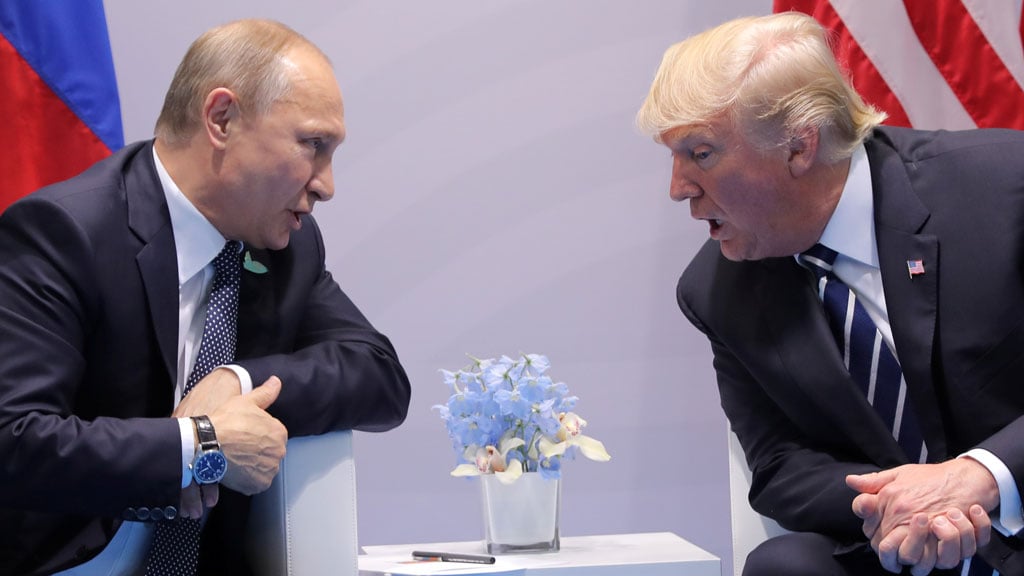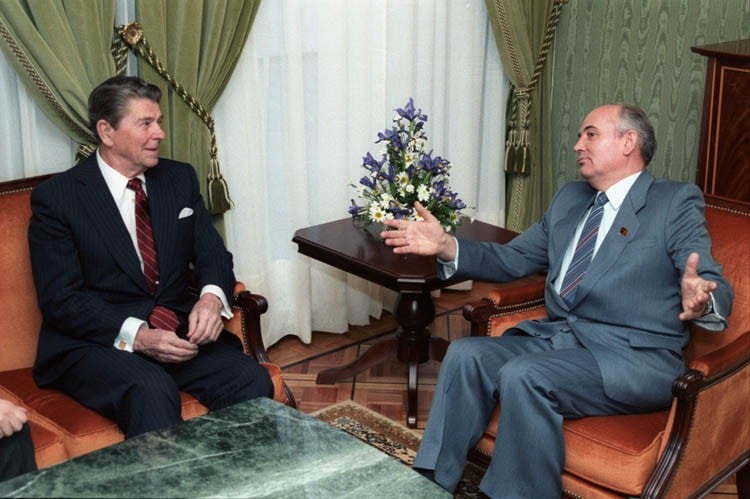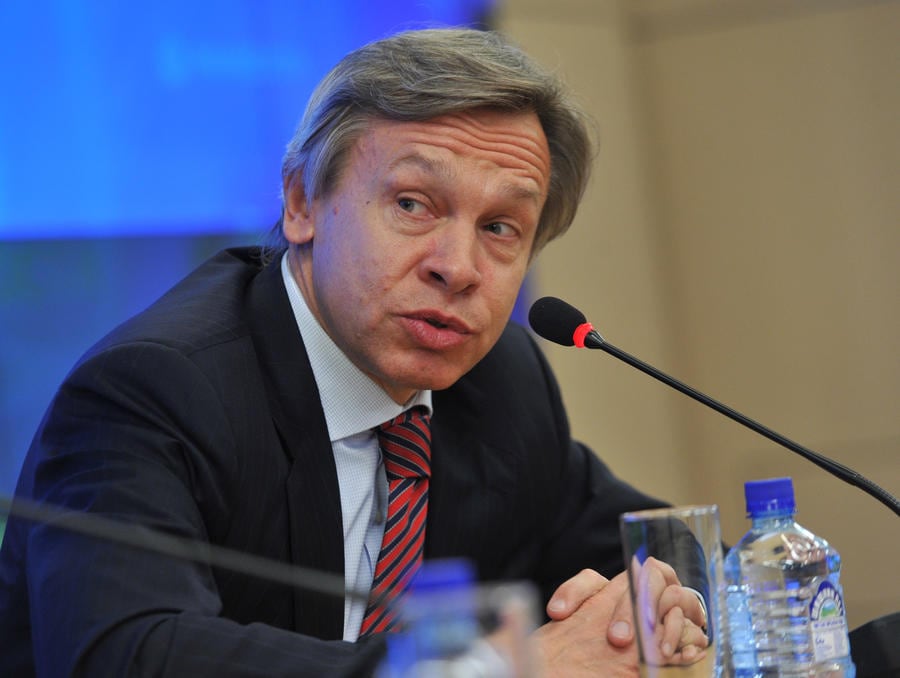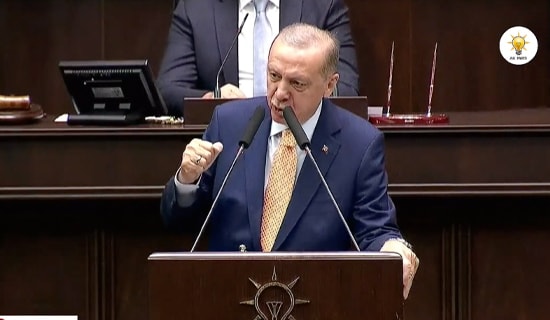Since Donald Trump's surprise victory in the 2016 presidential elections, Russian expectations from the new administration have experienced a roller coaster ride. It began with lavish expectations about the imminent abrogation of sanctions and the abandonment of the anti-Russian policies of Trump's predecessor Barack Obama. The wild expectations were soon replaced by more sober and somber expectations that at best viewed Trump as well intentioned towards Russia but stymied by a Russophobic establishment that included key figures within his own party. Therefore the outlook for improved relations had turned bleak. Now following the meeting between Trump and Vladimir Putin at the G20, the first tranche of responses reflects a sense of restored optimism in Russia about Trump.
Below. MEMRI presents a representative sampling of responses that will be concluded by a tsunami-like tweet storm from Senator Aleksey Pushkov, who calls it as he sees it.

Putin and Trump (Source: Ntv.ru)
The last president of the Soviet Union Mikhail Gorbachev compared the meeting between Russian and US leaders Vladimir Putin and Donald Trump at the G20 summit in Hamburg to his own meeting with former president Ronald Reagan. He advised Putin to learn from his experience in thwarting those American circles intent on derailing rapprochement.
"I recall when we started the disarmament dialog with Ronald Reagan, I was told in several days after first contacts that US naval vessels entered the Black Sea and approached territorial waters of the Soviet Union. I was asked, "What shall we do?" I understood immediately this was a provocation: someone in the Pentagon did not want that dialog," Gorbachev said.
Handshaking between Putin and Trump is a positive signal, opined Gorbachev. "This opportunity should not be missed. It will be challenging but this meeting is very important. It may become a starting point to deliver results seemed to be unachievable [until] now," Gorbachev said.
(Tass.com, July 9, 2017)

Déjà vu? Gorbachev with Ronald Reagan (Source: Reaganlibrary.archives.gov)
Putin, Lavrov Set The Tone
The Russian reactions fell in line with the tone set by President Putin and Foreign Minister Sergey Lavrov. Putin at a press conference summing up the Hamburg G-20 summit paid Trump the following compliment:
"As regards personal relations, I believe that they have been established. This is how I see it: Mr Trump's television image is very different from the real person; he is a very down to earth and direct person, and he has an absolutely adequate attitude towards the person he is talking with; he analyses things pretty fast and answers the questions he is asked or new ones that arise in the course of the discussion. So I think that if we build our relations in the vein of our yesterday's meeting, there are good reasons to believe that we will be able to revive, at least partially, the level of interaction that we need."
(Kremlin.ru, July 8, 2017)
Russian Presidential Spokesman Dmitry Peskov amplified what Putin found reassuring about the American president: "Judging by the president’s impression, Trump is a very efficient person," Peskov told the Rossiya 1 TV channel.
(Tass.com, July 10, 2017)
"He has full expert knowledge, is very persistent and uses facts skillfully," the Kremlin spokesman said referring to the Russian leader’s impression of his meeting with Trump.Peskov described those accusing Trump of incompetence as betraying the same "schizophrenic stuff" characteristic of the anti-Russian hysteria endemic in US political circles.
Peskov was careful to avoid the trap of crowing over Russia's presumed victory in the talks, a triumphalism that some of the other commentators lapsed into. According to him, it is "absurd" to try to guess who has won these talks. "As a matter of fact, after this meeting we can say it confidently that all have won."
(Tass.com, July 9, 2017)
Foreign Minister Lavrov at a press conference also sounded upbeat:
"Question: Mr Lavrov, how did this long meeting [between Putin and Trump] go?
"Sergey Lavrov: If the presidents see that they have issues to discuss and to solve something rather than just exchange opinions, I don’t think that time is of paramount importance. Indeed, they had a very long conversation. My feeling was confirmed that President of the Russian Federation Vladimir Putin and President of the United States Donald Trump are driven by the national interests of their countries and pursue them primarily by seeking to achieve mutually beneficial agreements rather than trying to act out confrontational scenarios and invent problems out of the blue. It was in this concrete and business-like vein that Syria, Ukraine, the Korean Peninsula, cyber security and a number of other issues were discussed….
"Sergey Lavrov: The atmosphere was constructive. As I said in the beginning, the tone was set by the desire of both presidents to promote the national interests of Russia and the United States, respectively. It was determined by the understanding that each country will be able to do this better if we cooperate and seek a balance of interests, and also if we work for stabilization in different parts of the world, where the situation is very turbulent, be it the Middle East or North Africa, the Korean Peninsula or Afghanistan."
Pyotr Tolstoy, a deputy speaker of the Russian State Duma lower parliament house and head of the Russian delegation to the Parliamentary Assembly of the Organization for Security and Cooperation in Europe (OSCE) thought that the meeting and the constructive atmosphere in which it was held could signal a thaw in the bilateral relations:
"A personal meeting between the two heads of state has major significance for the solution of the complicated tasks of revival of relations between Russia and the United States," said. "I am happy that such a meeting has taken place. All agreed that it was held in a constructive atmosphere and exceeded its original timeframes."
Tolstoy was also encouraged by the fact that the two leaders had "outlined first steps on such sensitive matters as Ukraine, Syria, cyber security, anti-terrorism efforts." "Russia and the United States could have made bigger progress on these dossiers if the United States had a more constructive position one, two, three years ago. It’s good that mutual understanding on how to tackle these major international problems has now been reached."
(Tass.com, July 8, 2017)
Senator Konstantin Kosachev, who chairs the Federation Council's International Affairs Committee, was even more effusive:
"The results of the Presidents' meeting surpassed my expectations, and I'm sure – not only mine. There were many concrete [matters] : Russia and the US are beginning either to cooperate in practice ( Syria), or discuss ( Ukraine, cyber-security) the most important questions, defining the character of the bilateral relations". He added that in some sense the results can be considered a breakthrough: "Definitely – ( this is a breakthrough ) in psychological and possibly practical terms".
(Ria.ru, July 7, 2017.)
SUPPORT OUR WORK

Senator Franz Klintsevich, deputy chair, of the Federation Council's Defense and Security Committee believed that the Putin-Trump meeting had cleared the air and removed misperceptions:
"The President [Putin] has explained Russia's stance on all the major questions, raised at the summit – Syria, Ukraine, his relations with Donald Trump. (He ) has not left any room for any free unfriendly interpretations. As they say: he, who has ears, must hear". The senator added that Putin had remained firm on Syria and Assad's fate will be decided "irrespective of the US administration's desires".
"With regards to relations with the American president, the personal contact is established. This is crucially important. Of course, difference between Russia and the US arising from geopolitical interests won't go away, but the contentious issues can be resolved much more successfully, once the subjective [personal] factor is at work".
(Ria.ru, July 8, 2017)
Klintsevich had earlier credited the meeting with slightly opening the tightly shut and barricaded door of bilateral relations and realistically added: "Certainly, no one at the moment has the audacity to guarantee that there will be serious progress in our countries' relations and that the countries will seriously start cooperating in resolving international problems, starting with the problem of ISIS. But at least such a reversal is no longer deemed to be something out of the realm of science fiction ".
(Ria.ru, July 7, 2017)
For Nikolay Mironov, the Director of the Center for Economic and Political Reforms a constructive American attitude was on display at the talks:
"This is important for it removes to a large extent the question of whether the new US administration would act like its predecessor as the previous one, with the same negative to every Russian position". Regarding Syria , Mironov belives that the meeting demonstrated Trump's constructive attitude on the one hand, while on the other Russia has succeeded in achieving its interests in Syria : "We could not have possibly achieved more at the given moment, considering that we lack a broad global coalition and numerous allies there - therefore this is a success. Obviously, there are some questions regarding the northern part [of Syria], but in general we may say that a status quo is being established there. If this is actually implemented in practice – this will be considered a major diplomatic success".
(Ria.ru, July 8, 2017)
MP Adalbi Shkhagoshev, who sits on the State Duma's international affairs committee: "This agreement (Syria) testifies that at the very minimum the US has recognized and understood that Russia will not relinquish its positions gained in Syria and will defend them. It is clear that Trump recognizes Russia's serious intentions in Syria and wants to be a part of a process of stabilizing the situation in that country and take part in solving the problems in Syria together with Russia".
(Ria.ru, July 7, 2017)
Gevorg Mirzoyan, a columnist for the RIA news agency wrote in his article, titled "The Views of Strong Men: On What Did Putin and Trump Agree?": " Of Course ( we ) should not have expected that during this meeting, which Lavrov called "purely political" the two leaders would have been served with two beers and the map of Ukraine, or what would have been even more desirable– a bucket of champagne and a globe – it's still a long way to Yalta II [the original 1945 Yalta conference between Stalin, Churchill and Roosevelt recognized the Soviet gains in Poland by moving it westward at Germany's expense and conceded Eastern Europe to the Soviet sphere of influence. ] But some compromises have been reached.
(Ria.ru, July 8, 2017)
Dmitry Trenin, director, Moscow's Carnegie Center: "If not [personal] "chemistry", then a business relationship between Putin and Trump was established. This is of course positive…. But the conflict between Russia and the US is of fundamental important– it's about world order and thus, is won't be speedily and easily resolved ".
(Vedomosti.ru, July 7, 2017)
Fedor Lukyanov, editor in chief of Russia in Global affairs and Valdai Discussion Club Program Director, injected a note of pessimism. While he believes that the G-20 went better than expected for Russia and "regarding Russia-US relations, the summit achieved more, than could have been anticipated. It is unlikely that the positive and constructive atmosphere of the Putin-Trump negotiations signifies that everything will get better from now on. The US president's desire and position is one thing, and what he is able to do within the fierece political conflict surrounding him is a totally different matter. I believe, that many things which sounded very constructively yesterday, will undergo a devaluation in the upcoming period. Either Trump will concede some things, or the Congress will tie his hands. I think Trump and Putin, having communicated in person, understood that they can deal with each other.
If they, after having communicated in person, had reached the conclusion that it was hopeless and not worth an effort, that would have been a negative result"
(Nsn.fm, July 8, 2017)
Pushkov's Tweetstorm:

Aleksey Pushkov (Source: Bigcitystar.ru)
"It seems like the period of extreme irritation between Russia and the West is drawing to a close. Trump is not Obama. Macron needs Moscow. There is a move on Syria. "
(Twitter.com/Alexey_Pushkov, July 9, 2017)
"Trump had a two-hour talk with Putin and said the meeting was 'outstanding'. He is not Obama, who compared Russia to Ebola. Completely different president.
(Twitter.com/Alexey_Pushkov, July 8, 2017)
"Trump did the right thing by having an in-depth dialog with Putin. Those in the US who hate him anyway would not forgive him - neither for a long nor for a brief meeting."
(Twitter.com/Alexey_Pushkov, July 8, 2017)
"[Nikki] Haley knows so much, that she easily talks nonsense. She "knows" that Russia is meddling in the elections over the entire world. The entire world does not know, but she does."
(Twitter.com/Alexey_Pushkov, July 8, 2017)
"It was important for Trump to hear Putin: he [Trump] is being stuffed with informational "crap" blended with fakes. [It was also important for Trump] to understand that they [Putin and Trump] sound alike in some issues."
(Twitter.com/Alexey_Pushkov, July 7, 2017)
"The Neocons are furious: Trump accepted Putin's word on Russia's non-interference in the US elections. Trump does not want to be left standing at a bus stop called "Anti-Russian hysteria."
(Twitter.com/Alexey_Pushkov, July 7, 2017)
The mere fact of Putin-Trump meeting and the scope of issues discussed is a breakthrough. No one expected any other breakthrough. On the personal level a breakthrough occurred.
(Twitter.com/Alexey_Pushkov, July 7, 2017)
"Facing total opposition to the joint cybersecurity group Trump is backing off. He acts under huge pressure. Not his fault, but his disaster."
(Twitter.com/Alexey_Pushkov, July 9, 2017)

"Russophobic Senator [Lindsey] Graham called Putin-Trump meeting 'disastrous'. It is disastrous for Graham, McCain and their [political] line. But it's important for peace.
(Twitter.com/Alexey_Pushkov, July 9, 2017)
"Trump promised not to lift sanctions against Russia. In the context of his meeting with Putin this is rhetorical compensation for the Russophobic part of the US political elite."
(Twitter.com/Alexey_Pushkov, July 9, 2017)
"Rubio bets on the wrong horse: Russophobia is left for provincial politicians from the Baltics or Florida. Big leaders do not follow it [Russophobia] "
(Twitter.com/Alexey_Pushkov, July 9, 2017)
"Trump said that it's about time to advance to constructive work with Russia. He's got more common sense than Obama and Hillary."
(Twitter.com/Alexey_Pushkov, July 9, 2017)

"Some parts of Trump's administration, let's say Haley, react to Putin-Trump meeting on a par with CNN: underline the negative, threaten, push fake news."
(Twitter.com/Alexey_Pushkov, July 9, 2017)
Pushkov mocked former White House Communications Director for an article she wrote deriding Trump for CNN
"In order to be considered an expert in the US it's enough to say: 'Trump fell into Putin's trap'. Here you go, Psaki, who does not differentiate Iran from Iraq, is CNN's expert."
(Twitter.com/Alexey_Pushkov, July 9, 2017)
"When Psaki, who made the world laugh at her ignorance, speaks as an expert, it says a lot about the intellectual level of American political class."
(Twitter.com/Alexey_Pushkov, July 9, 2017)




